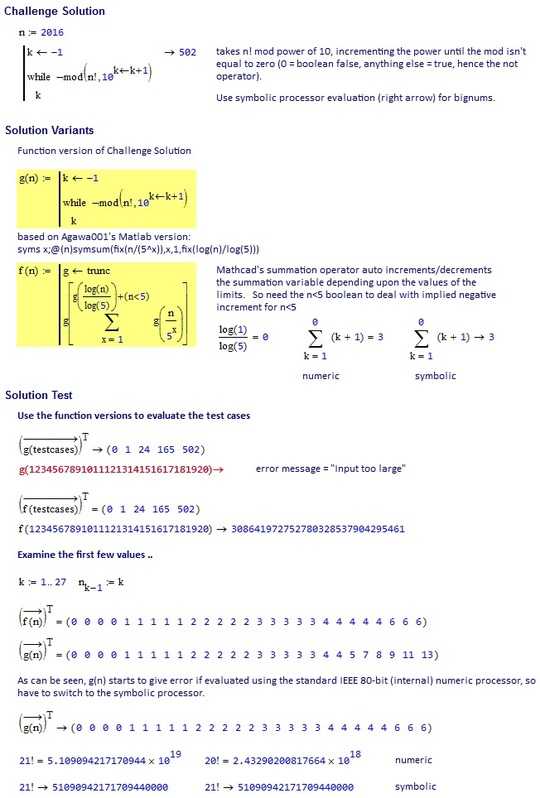35
2
Write a program or function that finds the number of zeroes at the end of n! in base 10, where n is an input number (in any desired format).
It can be assumed that n is a positive integer, meaning that n! is also an integer. There are no zeroes after a decimal point in n!. Also, it can be assumed that your programming language can handle the value of n and n!.
Test cases
1
==> 0
5
==> 1
100
==> 24
666
==> 165
2016
==> 502
1234567891011121314151617181920
==> 308641972752780328537904295461
This is code golf. Standard rules apply. The shortest code in bytes wins.
Submissions
To make sure that your answer shows up, please start your answer with a headline, using the following Markdown template:
# Language Name, N bytes
where N is the size of your submission. If you improve your score, you can keep old scores in the headline, by striking them through. For instance:
# Ruby, <s>104</s> <s>101</s> 96 bytes
If there you want to include multiple numbers in your header (e.g. because your score is the sum of two files or you want to list interpreter flag penalties separately), make sure that the actual score is the last number in the header:
# Perl, 43 + 2 (-p flag) = 45 bytes
You can also make the language name a link which will then show up in the leaderboard snippet:
# [><>](http://esolangs.org/wiki/Fish), 121 bytes
Leaderboard
Here is a Stack Snippet to generate both a regular leaderboard and an overview of winners by language.
/* Configuration */
var QUESTION_ID = 79762; // Obtain this from the url
// It will be like https://XYZ.stackexchange.com/questions/QUESTION_ID/... on any question page
var ANSWER_FILTER = "!t)IWYnsLAZle2tQ3KqrVveCRJfxcRLe";
var COMMENT_FILTER = "!)Q2B_A2kjfAiU78X(md6BoYk";
var OVERRIDE_USER = 43444; // This should be the user ID of the challenge author.
/* App */
var answers = [], answers_hash, answer_ids, answer_page = 1, more_answers = true, comment_page;
function answersUrl(index) {
return "https://api.stackexchange.com/2.2/questions/" + QUESTION_ID + "/answers?page=" + index + "&pagesize=100&order=desc&sort=creation&site=codegolf&filter=" + ANSWER_FILTER;
}
function commentUrl(index, answers) {
return "https://api.stackexchange.com/2.2/answers/" + answers.join(';') + "/comments?page=" + index + "&pagesize=100&order=desc&sort=creation&site=codegolf&filter=" + COMMENT_FILTER;
}
function getAnswers() {
jQuery.ajax({
url: answersUrl(answer_page++),
method: "get",
dataType: "jsonp",
crossDomain: true,
success: function (data) {
answers.push.apply(answers, data.items);
answers_hash = [];
answer_ids = [];
data.items.forEach(function(a) {
a.comments = [];
var id = +a.share_link.match(/\d+/);
answer_ids.push(id);
answers_hash[id] = a;
});
if (!data.has_more) more_answers = false;
comment_page = 1;
getComments();
}
});
}
function getComments() {
jQuery.ajax({
url: commentUrl(comment_page++, answer_ids),
method: "get",
dataType: "jsonp",
crossDomain: true,
success: function (data) {
data.items.forEach(function(c) {
if (c.owner.user_id === OVERRIDE_USER)
answers_hash[c.post_id].comments.push(c);
});
if (data.has_more) getComments();
else if (more_answers) getAnswers();
else process();
}
});
}
getAnswers();
var SCORE_REG = /<h\d>\s*([^\n,]*[^\s,]),.*?(\d+)(?=[^\n\d<>]*(?:<(?:s>[^\n<>]*<\/s>|[^\n<>]+>)[^\n\d<>]*)*<\/h\d>)/;
var OVERRIDE_REG = /^Override\s*header:\s*/i;
function getAuthorName(a) {
return a.owner.display_name;
}
function process() {
var valid = [];
answers.forEach(function(a) {
var body = a.body;
a.comments.forEach(function(c) {
if(OVERRIDE_REG.test(c.body))
body = '<h1>' + c.body.replace(OVERRIDE_REG, '') + '</h1>';
});
var match = body.match(SCORE_REG);
if (match)
valid.push({
user: getAuthorName(a),
size: +match[2],
language: match[1],
link: a.share_link,
});
});
valid.sort(function (a, b) {
var aB = a.size,
bB = b.size;
return aB - bB
});
var languages = {};
var place = 1;
var lastSize = null;
var lastPlace = 1;
valid.forEach(function (a) {
if (a.size != lastSize)
lastPlace = place;
lastSize = a.size;
++place;
var answer = jQuery("#answer-template").html();
answer = answer.replace("{{PLACE}}", lastPlace + ".")
.replace("{{NAME}}", a.user)
.replace("{{LANGUAGE}}", a.language)
.replace("{{SIZE}}", a.size)
.replace("{{LINK}}", a.link);
answer = jQuery(answer);
jQuery("#answers").append(answer);
var lang = a.language;
if (/<a/.test(lang)) lang = jQuery(lang).text();
languages[lang] = languages[lang] || {lang: a.language, user: a.user, size: a.size, link: a.link};
});
var langs = [];
for (var lang in languages)
if (languages.hasOwnProperty(lang))
langs.push(languages[lang]);
langs.sort(function (a, b) {
if (a.lang > b.lang) return 1;
if (a.lang < b.lang) return -1;
return 0;
});
for (var i = 0; i < langs.length; ++i)
{
var language = jQuery("#language-template").html();
var lang = langs[i];
language = language.replace("{{LANGUAGE}}", lang.lang)
.replace("{{NAME}}", lang.user)
.replace("{{SIZE}}", lang.size)
.replace("{{LINK}}", lang.link);
language = jQuery(language);
jQuery("#languages").append(language);
}
}body { text-align: left !important}
#answer-list {
padding: 10px;
width: 290px;
float: left;
}
#language-list {
padding: 10px;
width: 290px;
float: left;
}
table thead {
font-weight: bold;
}
table td {
padding: 5px;
}<script src="https://ajax.googleapis.com/ajax/libs/jquery/2.1.1/jquery.min.js"></script>
<link rel="stylesheet" type="text/css" href="//cdn.sstatic.net/codegolf/all.css?v=83c949450c8b">
<div id="answer-list">
<h2>Leaderboard</h2>
<table class="answer-list">
<thead>
<tr><td></td><td>Author</td><td>Language</td><td>Size</td></tr>
</thead>
<tbody id="answers">
</tbody>
</table>
</div>
<div id="language-list">
<h2>Winners by Language</h2>
<table class="language-list">
<thead>
<tr><td>Language</td><td>User</td><td>Score</td></tr>
</thead>
<tbody id="languages">
</tbody>
</table>
</div>
<table style="display: none">
<tbody id="answer-template">
<tr><td>{{PLACE}}</td><td>{{NAME}}</td><td>{{LANGUAGE}}</td><td>{{SIZE}}</td><td><a href="{{LINK}}">Link</a></td></tr>
</tbody>
</table>
<table style="display: none">
<tbody id="language-template">
<tr><td>{{LANGUAGE}}</td><td>{{NAME}}</td><td>{{SIZE}}</td><td><a href="{{LINK}}">Link</a></td></tr>
</tbody>
</table>
Related. – xnor – 2016-05-12T02:39:01.220
Can we assume that n! will fit within our languages' native integer type? – Alex A. – 2016-05-12T02:45:52.147
@AlexA. Yes you can. – Arcturus – 2016-05-12T03:01:31.193
Can
nbe an input string? – Conor O'Brien – 2016-05-12T03:10:22.030@CᴏɴᴏʀO'Bʀɪᴇɴ Yes. – Arcturus – 2016-05-12T03:11:03.853
15I think this would be a better question if you were not allowed to assume
n!would fit into your integer type! Well, maybe another time. – A Simmons – 2016-05-12T10:45:52.980@ASimmons Most of the answers so far, or at least the ones that use the floor division trick, don't rely on that assumption anyway. – Alex A. – 2016-05-12T16:53:21.390
https://oeis.org/A027868 – Willem – 2016-05-13T17:13:22.147
I was wondering this today as well after seeing a number of ways a pack of cards can be shuffled. – philcolbourn – 2016-05-17T19:08:07.750
Also of interest: Last non-zero digit of
– Toby Speight – 2018-06-05T10:49:26.530n!.